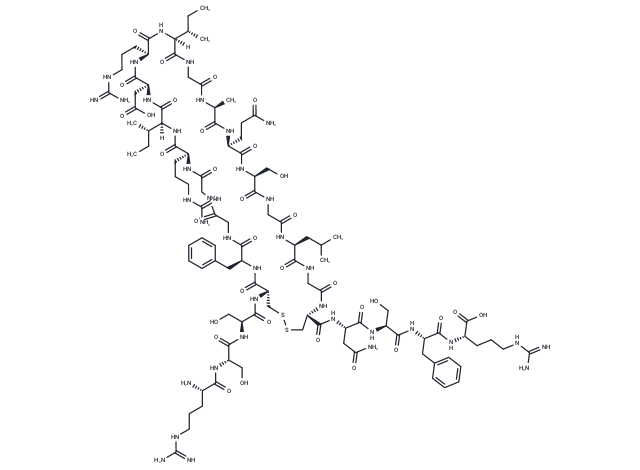Shopping Cart
- Remove All
 Your shopping cart is currently empty
Your shopping cart is currently empty

Auriculin A, a synthetic atrial natriuretic factor (ANF), exhibits hemodynamic properties by antagonizing renal vasoconstriction in dogs and affects arterial baroreflex regulation of heart rate, systemic blood pressure, and constant flow-perfused hind limb perfusion pressure in rabbits [1] [2].

| Pack Size | Price | Availability | Quantity |
|---|---|---|---|
| 5 mg | Inquiry | Backorder | |
| 50 mg | Inquiry | Backorder |
| Description | Auriculin A, a synthetic atrial natriuretic factor (ANF), exhibits hemodynamic properties by antagonizing renal vasoconstriction in dogs and affects arterial baroreflex regulation of heart rate, systemic blood pressure, and constant flow-perfused hind limb perfusion pressure in rabbits [1] [2]. |
| In vivo | Auriculin A, administered intravenously at a dose of 0.3 μg/min/kg for 30 minutes, counteracts renal vasoconstriction in canines [1]. At a different dosing regimen—2 μg/kg initially, followed by 0.2 μg/kg/min for 45 minutes, intravenously—Auriculin A affects arterial baroreflex regulation of heart rate, systemic blood pressure, and constant flow-induced perfusion pressure in the hind limbs of rabbits [2]. |
| Molecular Weight | 2542.81 |
| Formula | C104H168N38O33S2 |
| Cas No. | 91421-87-3 |
| Storage | keep away from moisture | Shipping with blue ice. |

Copyright © 2015-2025 TargetMol Chemicals Inc. All Rights Reserved.